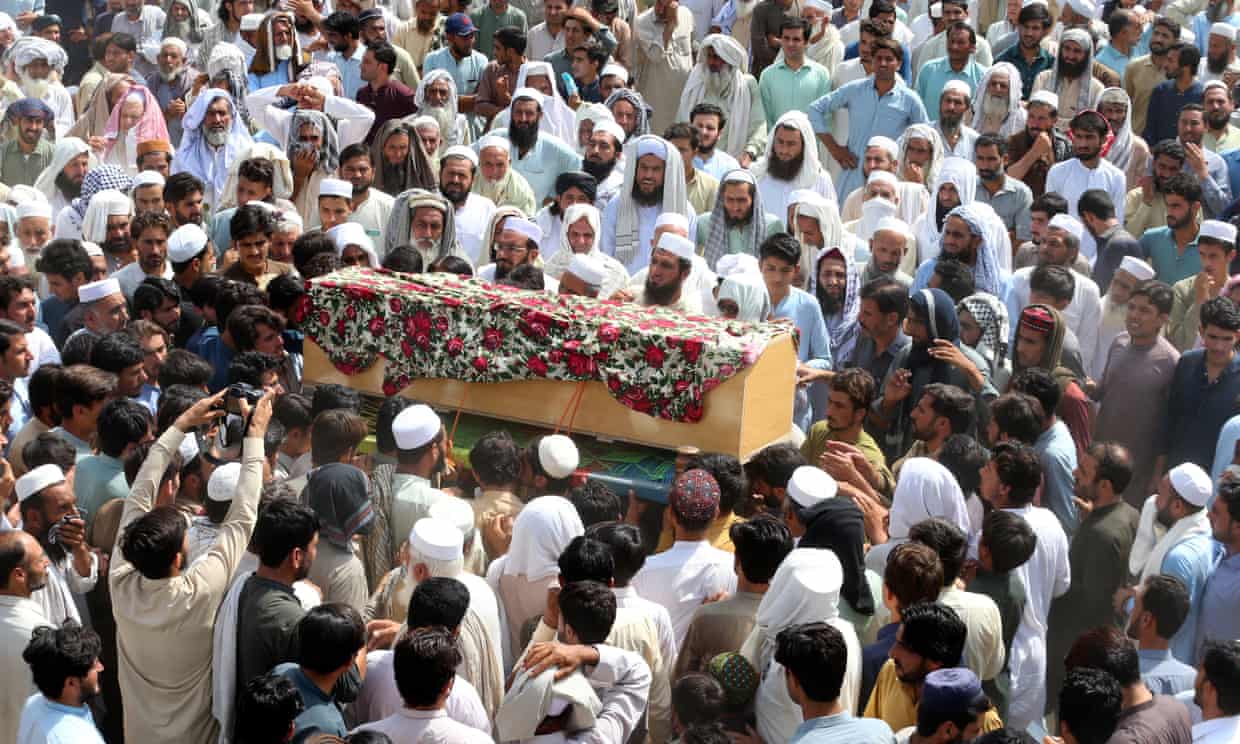The Democracy That Is Nuclear Pakistan
"The rising instability and militant attacks provide a window to all militant organizations, including ISKP [branch of Islamic State centred in Afghanistan], to ramp up their attacks.""These attacks on police, political rallies and security forces have ended the brief illusion of peace in Pakistan."Zahid Hussain, political analyst"People were chanting 'God is Great' as the leaders arrived.""[I was standing outside the tent] and that was when I heard the deafening sound of the bomb."Khan Mohammad, local resident
 |
| Relatives and mourners carry the casket of a victim killed in Sunday's suicide bombing in Khyber Pakhtunkhwa, Pakistan. Photograph: Mohammad Sajjad/AP |
Violent
Islamists have long made a comfortable home for themselves in Pakistan.
It is where Osama bin Laden, the leader of al-Qaeda was given safe
haven at Abbottabad, when U.S. troops in Afghanistan were searching for
his whereabouts after the mastermind of the 9/11 events publicly
celebrated its success. Masquerading as a 'partner' with the West in the
campaign against terrorism, Pakistan's military and its Inter-Services
Intelligence agency founded, trained and equipped the Afghanistan
Taliban, recognized universally as a terrorist group.
Pakistan's
leaders appear to have overlooked the growing militancy of its own
Taliban in the process of supporting one that would eventually misrule
its neighbour. The tribal villages in the mountains between Afghanistan
and Pakistan are a never-ending source of vibrant, violent extremism,
and a threat to Pakistan itself necessitating that the Pakistan military
engage in battles as the tribal extremists made an effort to extend
their territory, endangering nearby nuclear weapons depots.
From
Pakistan, a terrorist group of extremist Islamists infiltrated and
attacked Indian Mumbai in a bloody four-day assault and massacre that
succeeded in killing over 160 people, by Lashkar-e-Taiba (LeT) or Army
of the Pure, in November of 2008. The country is a breeding ground for
terrorist groups. And now the Islamic State has claimed responsibility
for the latest suicide bombing that killed 56 people attending an
election rally for a pro-Taliban cleric.
The
bombing took place in Bajur, wounding close to two hundred people,
killing at least five children. A reflection of tribal/sectarian
antipathies between Islamist groups, present in Kyber Pakhtunkhwa
province, bordering Afghanistan. The ISIL group targeted the Jamiat
Ulema Islam party whose chief is cleric and politician Fazlur Rehman,
with ties to both the Afghan and Pakistani Taliban.
An
estimated thousand people were crowded within a tent near a market, for
a rally preparatory to fall elections. Khan Mohammad, a local resident
who stood outside the tent and witnessed the aftereffects of the bomb
blast, stated later that he had heard people crying for help. Minutes
afterward, ambulances arrived to begin evacuating the hundreds of
wounded people.
 |
| An ambulance is set to transport injured people after a bomb explosion in the Bajur district of Pakistan's Khyber Pakhtunkhwa province on Sunday. (Rescue 1122 emergency service/The Associated Press) |
Investigating
police knew well before the statement implicating the Islamic State in
the carnage, that an initial investigation led them to believe that the
regional affiliate of Islamic State, a Taliban rival, would be the
likeliest source to have been involved. This, despite that a Pakistani
security analyst pointed to factions that had broken off from the
Pakistani Taliban as possible suspects, instead. Pakistan does not lack
for any number of viral, vicious Islamist terror groups; they find their
natural home there.
By
Monday funerals were taking place for the dead. Local customs mandate
that female relatives and children at their family homes, cry out loudly
in their grief, while beating their chests in anguish. Hundreds of men
gathered around to follow caskets to mosques and open areas for funeral
prayers and then to trek into the hills for burial services in rituals
as old as time itself.
Those
that could be treated for relatively light wounds sustained in the
blast were released from hospital while the critically wounded were
transported to the provincial capital of Peshawar by army helicopters.
Some critically wounded people died while in hospital and it is expected
that the death count may yet climb again as more succumb to their
grievous wounds.
 |
| A worker inspects the scene of the explosion in the Bajur district of northwest Pakistan on Sunday. (Rescue 1122 emergency service/The Associated Press) |
Labels: Afghanistan, Islamic State, Khyber Pakhtunkhwa Province, Pakistan, Suicide bombing, Taliban

<< Home